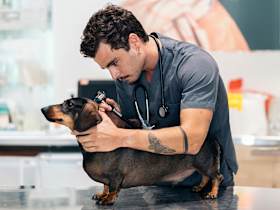The Ultimate Guide to Pet Health Checkups
Regular vet visits are key to keeping your pet healthy. Here’s what happens during a checkup, when to get them, and what to bring.
Regular vet visits are key to keeping your pet healthy. Here’s what happens during a checkup, when to get them, and what to bring.
by Katie Koschalk, | April 18, 2025

Friends Stock / AdobeStock
Keeping your pet healthy isn’t just about treating problems as they pop up — it’s about staying ahead of them. That’s where regular pet health checkups (aka wellness exams) come in. These routine exams are all about prevention. They allow your veterinarian to evaluate your pet’s overall health, catch early signs of illness, and make sure they’re up to date on vaccines, parasite protection, and more.
Wondering how often your pet needs a wellness exam, what your vet checks for, or how to prep for your visit? Keep reading to find out.
If your pet seems happy and healthy, you might wonder, “Are vet checkups really necessary?” The short answer: absolutely. Here’s why annual wellness exams are so important.
Your vet needs to understand what your pet is like when they’re healthy, including their personality, appearance, movement, and overall physical condition, says veterinarian Heidi Cooley, DVM, CHPV, CCX, at Banfield Pet Hospital in Vancouver, Washington. “This can help the vet recognize even minor changes in your pet when they are sick.”
Going in for a checkup regularly is your best chance of catching a potential health problem. Early detection means your vet can start treatment sooner, which often leads to better outcomes and a quicker recovery for your pet.
Banfield Pet Hospital® is offering new clients a coupon for a free first veterinarian visit! (Terms apply.) Book yours now at one of their 1,000+ locations.

According to Dr. Cooley, some common issues that are discovered during wellness checks include ear infections, fleas, arthritis, obesity/weight concerns, and sometimes more serious issues like early diabetes.
“Well[ness] checks are also important for the vital preventive care needed to keep your pet well, like vaccines, fecal exams, and parasite prevention,” Dr. Cooley says. Skipping regular wellness exams might seem like a way to save money now, but it could lead to greater expenses and health concerns later on.

FG Trade / iStock
How often your pet should have a wellness exam depends on their age and health status. According to Dr. Cooley, these are the general guidelines.
Puppies and kittens: Young pets usually need vet visits every three weeks until they’re about four months old. These appointments help puppies and kittens complete their vaccination series and ensure they’re developing properly.
Adult pets: Healthy adult dogs and cats should have wellness exams every six to twelve months, depending on their lifestyle and individual needs.
Senior pets: For senior pets, wellness exams are recommended every six months, even if they appear healthy. Older pets are more prone to developing health issues, and routine check-ups can help catch these changes.
Pets with chronic conditions: Pets managing conditions such as diabetes, allergies, or arthritis often need check-ins every three months for ongoing monitoring, lab work, and treatment adjustments.
Curious about what happens during a pet wellness exam? Below is a breakdown of what typically takes place during the visit.
According to Dr. Cooley, your vet will usually start with a conversation about how your pet’s been doing at home. It’s the perfect opportunity to mention any concerns you’ve had, no matter how small they may seem.
Next, your veterinarian will perform a thorough nose-to-tail exam to evaluate your pet’s overall health and check for anything out of the ordinary. This typically includes the following.
Weight check: This helps monitor unhealthy weight gain or loss.
Temperature, heart rate, and respiration: Vital signs help assess overall health.
Eyes, ears, and mouth: By examining these areas, a vet will check for infections, dental disease, or other visible issues, and it helps them get a read of the overall health of your pet.
Skin and coat: Your vet will look here for signs of allergies, parasites, or skin conditions.
Palpation of abdomen and lymph nodes: The vet will feel for unusual lumps, swelling, or tenderness.
Joint and muscle evaluation: This helps a vet identify signs of arthritis or mobility issues.
Vaccines are a key part of preventive care. During your pet’s checkup, your vet will review their vaccine schedule and give any necessary shots.
Core vaccines: These core vaccines include vaccines for rabies, feline herpesvirus 1, feline calicivirus, feline panleukopenia, and feline leukemia virus.
Lifestyle-based vaccines: Your vet may recommend additional vaccines based on your pet’s environment or routine. For example, dogs who go to daycare, boarding, or the groomer might benefit from vaccines like Bordetella (kennel cough) or canine influenza.
Booster shots: If your pet is due for a booster shot, your vet will give it during the visit. Boosters help keep your pet’s immunity strong and up to date.
Keeping parasites at bay is crucial for your pet’s health (and yours). Your vet will look for signs of parasites and review your current prevention plan for fleas, ticks, and heartworm.
Your vet will ask about your pet’s diet and how much you’re feeding them to make sure they’re getting the proper nutrition for their age, size, and lifestyle. If needed, they may recommend switching foods or adding supplements to support their health.
Changes in behavior can be subtle signs of health issues or stress. Your vet will ask about, or check for, the following.
Changes in mood or habits: Any new behaviors (like increased barking, hiding, or accidents) are worth discussing.
Age-related changes: Senior pets may show signs of cognitive decline or anxiety.
Training or social concerns: Your vet can offer resources or referrals for behavior support.

Ivanko_Brnjakovic / iStock
Don’t have a vet yet? With Banfield Pet Hospital® you can find one who can help you navigate the wild ride of pet parenthood — and your first visit is free! (Terms apply.)
Being prepared can make your pet’s wellness visit smoother and more productive. According to Dr. Cooley, here’s what you should bring along.
A list of questions or concerns: Jot down any changes in your pet’s behavior, eating habits, or routines. Bring up anything that’s been on your mind.
Your pet’s current medications or supplements: Bring the bottles — or write down the names and dosages — so your vet knows exactly what your pet is taking.
Your pet’s health records: If you’re changing veterinarians, request that your pet’s medical records be sent to the new clinic ahead of time (or bring a copy with you to the first appointment).
A poop sample: Many vets recommend bringing a fresh stool sample to screen for intestinal parasites and infections.
Your pet (safely secured): Use a secure carrier for cats and a leash or harness for dogs.
A favorite treat or toy: This can help reduce anxiety and reward good behavior during the exam.
Your pet’s exam is a great opportunity to ask questions and get expert advice. Not sure what to bring up? Here are a few smart questions to consider.
Is my pet at a healthy weight? Get personalized insight on whether or not your pet is underweight, overweight, or right where they should be.
Should I make any changes to their diet? Ask if your pet’s current food meets their nutritional needs or if it’s time to adjust.
How can I support my pet’s hygiene? From dental care to ear-cleaning and grooming, ask your vet which hygiene habits are recommended for your dog's or cat’s health and comfort.
Is my pet getting enough exercise? Ask how much activity your pet needs each day and which types of exercise are best for their breed, age, and energy level.
How can I support their health as they age? Pets’ needs change over time. Get ahead of aging with guidance tailored to their life stages.
Should I be concerned about this behavior? Whether it’s barking, hiding, or litter box issues, your vet can help you figure out what’s normal and what’s not.
Can you explain that a little more? If something your vet says isn’t clear, don’t hesitate to ask for a simpler explanation.
Staying on top of your pet’s health doesn’t stop once you leave the vet’s office. Here are some simple but effective ways to support their well-being year-round.
Stick to a balanced diet: Feed high-quality food that meets your pet’s nutritional needs for their age and activity level. Avoid overfeeding or giving too many treats.
Keep up with parasite prevention: Continue monthly flea, tick, and heartworm preventives as recommended by your vet.
Stay active: Make sure your pet gets daily exercise that’s appropriate for their age and energy level.
Groom regularly: Brush their coat, clean their ears, and trim their nails to help prevent skin issues and discomfort.
Maintain dental hygiene: Brush their teeth or use dental chews, wipes, or water additives to support oral health.
Watch for changes: Pay attention to shifts in behavior, appetite, weight, or bathroom habits, and call your vet if something seems off.
A routine wellness exam typically costs between $50 and $150, depending on your location and what’s included. Additional services such as vaccines, lab work, or medications can raise the total. Learn about some options for more affordable pet care.
Your vet will give an overview of your pet’s weight, vital signs, dental health, body condition, and any signs of illness or age-related issues. They’ll also recommend any follow-up care or lifestyle changes if needed to give your pet a healthy life.
Dogs usually need monthly preventives for fleas, ticks, and heartworms. Depending on lifestyle and location, some may also need dewormers or other parasite control. Your vet will tailor a plan for your dog during their routine examinations.
A wellness check includes a physical exam, weight and vitals check, vaccination updates, parasite screening, dental check, nutrition and behavior discussion, and detailed information and recommendations for ongoing care to keep your pet in good health.
If you’re adopting a dog with medical needs, the rescue may want to speak with your vet to explain the condition and make sure you’re prepared for the care involved.
Malcolm Weir, et al. “Wellness Examination in Cats.” VCA Animal Hospitals, https://vcahospitals.com/know-your-pet/wellness-examination-in-cats.
Malcolm Weir, et al. “Wellness Examination in Dogs.” VCA Animal Hospitals, vcahospitals.com/know-your-pet/wellness-examination-in-dogs.
“Importance of Wellness Exams.” American Veterinary Medical Association, www.avma.org/resources-tools/pet-owners/petcare/importance-wellness-exams.

Katie Koschalk is a freelance writer based in Northern California. Fusing her love and knowledge of animals with her journalism degree and years of professional writing, Katie is dedicated to improving the lives of pets and their caretakers by sharing helpful and accurate information. When she’s not at her desk, you can find her exploring trails with her Aussie, Hunter, cooking plant-based meals, and talking to her two cats, Jax and Sadie, in really ridiculous voices.

Shelters & Rescue

Breed Info

Adoption Advice

Pet Wellness
Learn how to keep your adopted senior dog healthy and happy with this essential care advice.

Breed Info
It’s easy to become obsessed with these adorable pups. But it’s just as essential to understand their common health issues.

Adoption Advice
Wondering what to expect from your puppy’s first vet visit? Read more to learn about how to prepare and what to expect.

Pet Wellness
Cats are fastidious about their own cleanliness, but that doesn’t mean you won’t need to give them a little help along the way. Here’s how.

Adoption Advice
Help your underweight puppy achieve a healthy weight with these expert tips and feeding strategies.

Pet Wellness
Curious about how to feed your new dog? This guide will answer your questions.

Pet Wellness
These tips on maintaining good hygiene for your dog are crucial for their health, comfort, and overall well-being.

Adoption Advice
Is the responsibility of taking care of your pet causing you to worry about your budget? Rest assured, there are a number of ways to minimize this financial stress.

Adoption Advice
If your pet’s medical information seems confusing, you’re not alone. Here is how to better understand their records, so you can make sure your pet gets the care they need.